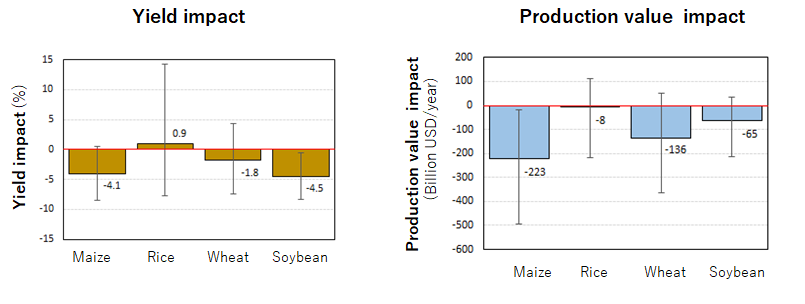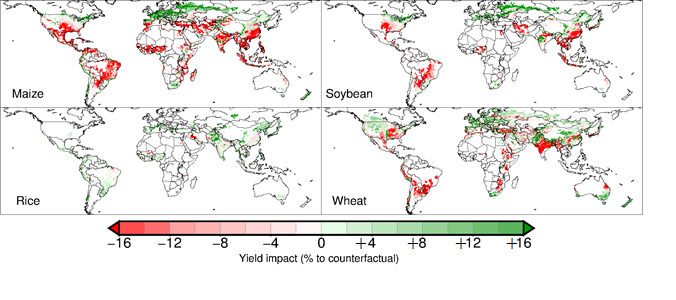NARO, in collaboration with the National Institute for Environmental Studies and the Japan Meteorological Agency/Meteorological Research Institute evaluated the impact of the global warming on the average yield (production per unit area) of major crops over the past 30 years (1981 - 2010) at the global scale. It was estimated that the global average yield of maize, wheat and soybean decreased by 4.1%, 1.8% and 4.5% respectively by global warming. In terms of monetary value, damage of maize, wheat and soybean was estimated to be 22.3 billion United States dollars ($), 13.6 billion $, 6.5 billion $ respectively. The total annual damage caused by global warming in recent years was 42.4 billion $. This result indicates the urgent demand to develop and disseminate adaptation measures for global warming to avoid further crop production loss in future.
Overview
In order to improve grain yield in the future even if global warming progresses, it is necessary to develop and disseminate technologies adaptable to global warming. In many developing countries with the remarkable population increase, popularization of adaptive technologies is highly required as most of them are located in the tropical and low latitude areas where massive negative impact of global warming is predicted. Therefore, while the developed countries and international organizations provide funds necessary for the introduction of technology to developing countries, scientific evidence is required for the influence of global warming and future prospects. However, since policy and economic conditions also influences the yield fluctuation, it has been difficult to quantitatively evaluate the impact of global warming alone.
Therefore, NARO in collaboration with the National Institute for Environmental Studies (NIES) and the Japan Meteorological Research Institute, has estimated the yield effect of global warming on the average yields of major crops such as corn, rice, wheat and soybean, globally over the past 30 years, using the climate database designed specifically for the detection and evaluation of global warming effects.
The estimated yield under the actual climatic conditions of the past with the influence of where global warming is compared with the estimated yield under the assumption of absence of global warming. It was found that the global average yield was lower for those estimated under actual climatic conditions except rice. The rate of yield decline due to global warming in the past years with respect to the yield without global warming was estimated to be 4.1% for maize, 1.8% for wheat and 4.5% for soybean. However, in the case of rice, it could not be concluded that the global warming had a significant impact on the global average yield.
The production loss is calculated by multiplying the estimated yield impact for every 50 km mesh, with the global harvesting area distribution of Year 2000 and Producer price by country (average value for 2005 - 2009). As a result, annual damage amounted to 42.4 billion $ worldwide, with corn 22.3 billion $, wheat 13.6 billion $ and soybean 6.5 billion $. Corn damage amounted to twice the annual production amount of Brazil, the third largest producer of the world.
These results indicate the urgent demand to develop and disseminate adaptation measures for global warming to avoid further loss in crop production in the future.
The results of this research were published in the scientific journal "International Journal of Climatology" of the Royal Meteorological Society of the UK.
For inquiries
Contact: http://www.naro.go.jp/english/inquiry/index.html
Publication
Toshichika Iizumi, Hideo Shiogama, Yukiko Imada, Naota Hanasaki, Hiroki Takikawa, Motoki Nishimori (2018) Crop production losses associated with anthropogenic climate change for 1981-2010 compared with preindustrial levels. International Journal of Climatology, https://doi.org/10.1002/joc.5818.
Reference Information

Fig. 1. Recent yield impact and production impact due to global warming (amount of damage)
The effect of global warming on world average yield over the past 30 years from 1981-2010 (left) and the damage amount on a global scale per year (right). The yield effect is the increase (%) in yield under actual climatic conditions including global warming, against the yield under climatic conditions with the assumption of no global warming. Production value impact (amount of damage) was calculated by multiplying the yield impact with the harvesting area and the producer price.

Fig. 2. Estimated yield impact due to global warming
The impact of global warming on the average yield over the past 30 years (1981 - 2010) is estimated by the yield model. The yield was estimated for the actual climatic conditions with global warming and the climatic conditions with assumption of without global warming, and the difference between them was regarded as the influence of global warming. Areas in red indicates that the yield declined due to global warming, areas in green indicates that the yield has increased due to global warming, and areas in white indicates those where crops have not been cultivated.




